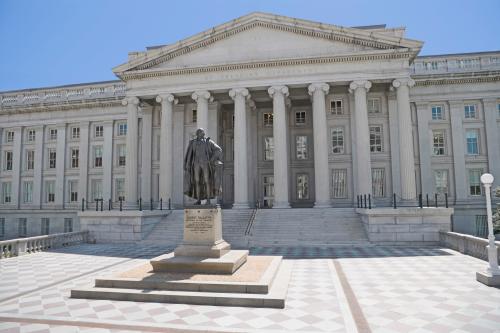Congress should establish a National Infrastructure Bank (NIB) capitalized with the proceeds from a one-time repatriation tax holiday. The primary barrier to an NIB—a targeted mechanism for financing infrastructure projects of national significance— is finding a way to build the loan fund. Untaxed overseas corporate profits, which currently provide little support to overstretched federal budgets, represent an untapped revenue source that could quickly fund an NIB, without a direct appropriation. While a similar repatriation holiday created through the 2004 American Jobs Creation Act failed to generate significant domestic stimulus, a targeted program focused on infrastructure has the potential to deliver job creating and economy building projects for decades to come.
According to the Congressional Budget Office, federal investment in infrastructure dropped by one-third over the past 30 years, leaving trillions of dollars in necessary competitiveness-boosting improvements unmade. These inefficiencies produce quantifiable drags on the economy. Increased travel times, wasted resources, and systemic unreliability in American infrastructure assets limit the growth of companies and disproportionately impact low-income communities.
The McKinsey Global Institute estimates that the United States needs to spend an additional $150 billion a year through 2020 to meet America’s infrastructure needs. This investment is expected to add nearly 1.5 percent to annual GDP and create at least 1.5 million jobs. Despite the key role infrastructure plays in the economy and the high expected return on investment, the federal government is currently unprepared to meet this funding goal.
Congressional aversion to raising taxes or taking on more debt means that infrastructure programs are likely to see static or declining funding levels for the foreseeable future, while the need for infrastructure investment is only projected to grow over the next decade. Lingering financial challenges at the state and local level further compound these problems.
Simultaneously, the United States is forgoing large amounts of revenue due to loopholes in the international tax code. To avoid double taxation of internationally generated corporate profits, the Internal Revenue Service (IRS) gives filers a tax credit equal to their international taxation liabilities. However, multi-national corporations are permitted to defer taxation on certain classes of foreign income until it is repatriated from foreign subsidiary accounts back to the parent firms. Through this complex system, corporations can use a number of different ownership and subsidiary structures spread across low-tax countries to hold large sums of money in foreign accounts.
An economic analysis by Harry Gubert and John Muttis showed that the effective tax rate for overseas profits can be less than three percent. In total, American corporations hold between $1.45 and $1.70 trillion in domestically untaxed deferred dividend payments that are routed through foreign countries including Ireland, the Netherlands, the Cayman Islands, Barbados, and other so called “tax-havens.” Because of the intricacy and risk of these tax structures, the majority of firms that take advantage of these shelters are large and well-established corporations.
Short of comprehensive tax reform, the American government has few options to recoup lost tax revenue on overseas corporate profits. One recent attempt to inject a portion of these funds directly into the American economy came through the American Jobs Creation Act of 2004 (AJCA). The bill was originally drafted to eliminate the Extraterritorial Income Provision, a tax deduction for exported goods, which was ruled an illegal trade subsidy by the World Trade Organization. However, a number of other provisions, including a one-time tax repatriation holiday, made it into the final legislation.
Under this measure, the IRS gave a one-time 85 percent tax exemption on repatriated overseas corporate profits, temporarily reducing the standard corporate tax rate of 35 percent to 5.25 percent for one year. Individual corporations could repatriate up to $500 million, but were required to adopt a plan to invest funds domestically in the hopes of creating jobs and stimulating spending. According to the IRS, 843 out of 9,700 eligible corporations used the deduction and repatriated $312 billion in overseas earnings. A small number of corporations, primarily high-tech firms, accounted for the majority of the repatriated funds. Not controlling for other factors, the Congressional Research Service found that corporations increased repatriations by almost 8 times their normal levels because of the reduced tax rate.
Unfortunately, the lack of enforcement mechanisms for the investment plans, paired with the fungibility of the repatriated dollars on corporate balance sheets, led to limited domestic economic stimulus. Jennifer Blouin and Linda Krull found that the majority of firms taking advantage of the program used the funds to repurchase their own stock, and did not primarily use the repatriated money to invest in infrastructure, research and development, or education. Furthermore, a study by Dhammika Dharmapala showed that every dollar repatriated was associated with a $0.60 to $0.92 increased payout to shareholders.
As a result, criticism of the AJCA was withering. The Economist called it a “lobbyists’ delight” and a new low in American tax policy. But if 2004’s repatriation holiday succeeded in one thing, it proved that preferred tax treatment is a highly effective way to reshore overseas corporate profits.
Proposal
The Metropolitan Policy Program at Brookings recommends the establishment of a national infrastructure bank, initially capitalized at around $25 billion. This appropriation would be directly offset through the authorization of a one-time tax reduction on repatriated corporate profits, temporarily decreasing the standard corporate tax rate to approximately 10 percent, and capped at $500 million per firm.
Based on analyses regarding the prior repatriation holiday, and estimates from the Joint Committee on Taxation, this general range will generate nearly $25 billion, which is consistent with recent NIB capitalization proposals.
By directing a percentage of the taxes attributable to a repatriation holiday into an NIB, Congress can:
- Stimulate the development of economically-critical infrastructure projects, that should create jobs and increase American global economic competiveness;
- Unlock billions of dollars in domestically untaxed corporate profits, which will further leverage billions more in investment from private, state, and local investors;
- Assist state and local governments by lowering the costs of borrowing, offering greater financial certainty, and easing the burden on tight budgets;
- Increase transparency by directly connecting repatriated funds to an infrastructure finance program that can drive the next American economy.
An NIB is an internationally-proven tool that helps get nationally significant infrastructure projects off the ground. A repatriation tax holiday has the potential to be an effective, simple, and relatively low-cost way to fund this economically important institution. Both need to be directed appropriately in order to improve the federal investment process and address the primary failing of the previous holiday; lax investment criteria that allowed repatriated funds to be recycled back into corporate balance sheets and not into high order domestic investment priorities.









